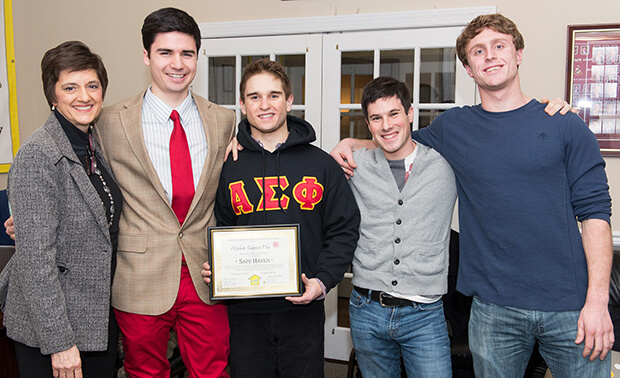- March 24, 2015
- By Alex Stoller
When Zachary Anstett ’15 said he wanted to make his fraternity a haven for victims of human trafficking, his father responded, “If I was a victim of human trafficking, the last place I would go is some frat house.”
It wasn’t the only time that Anstett, Alpha Sigma Phi’s community service director at UMD, got that reaction. But the fraternity went ahead with training from a national organization on how to recognize signs of human trafficking, direct survivors to helpful resources and educate other people on the issue.
“Human trafficking is not a Greek life issue, it’s a human issue,” Anstett says. “It isn’t enough for people to hold events and fundraisers for issues, but it is going to take a change in culture.”
The efforts by 14 fraternity brothers earned Maryland’s chapter of Alpha Sigma Phi official recognition as a Safe Haven, the first fraternity in the nation with the designation from the Safe Haven Campaign: Interfaith Alliance to Abolish Human Trafficking.
“This project wasn’t done in response to a particular incident that happened nation wide about fraternities,” says Angelo Bavaro ’17, Alpha Sigma Phi’s president. ”It’s because we care and we want to make a difference.”
Anstett says human trafficking, a modern form of slavery in which victims are coerced, forced or misled into performing labor, services or sex, is a bigger issue than people think. Because the crime operates underground, its extent is hard to estimate, but the U.S. Department of State in a 2005 report said 14,500 to 17,500 foreign nationals are trafficked into this country every year.
Louise Dickson, a volunteer coordinator for the Maryland chapter of Safe Haven, conducted Alpha Sigma Phi’s training on the issue. The training does not certify members to treat victims, but only to direct victims to people who can help them further.
“The fact that they have taken on this particular issue to make it a public awareness campaign brings light to the fact that some fraternities are doing really great things in the community,” she says.
Now, all of the 100 Alpha Sigma Phi brothers know about the issue, and they can use it as a conversation starter.
“If one brother tells three people, it spreads,” he says. “And then if one of those three people helps a victim, that’s how you make a difference. So this awareness for me was huge.”

After hearing about Alpha Sigma Phi’s recognition, student organizations across the country have contacted Dickson. She has also recently certified Towson University’s Student Government Association and Delta Sigma Phi from Loyola University in Chicago. Two sororities at UMD have also started the training. “These young men got together and started something nationwide because of their work,” she says.
The project parallels the fraternity’s efforts to prevent sexual assault. Alpha Sigma Phi’s national philanthropy is the Rape, Abuse & Incest National Network (RAINN).
On May 6, Anstett and Bavaro will lead a 12-hour sit-in of organizations across campus to draw attention to the problem of sexual assault. Speakers from the University Health Center’s Campus Advocates Respond and Educate (CARE) to Stop Violence, RAINN and Safe Haven will attend.
“This effort is to say, ‘Hey, we’re Greek, and we stand up to sexual assault,’” says Bavaro. “It’s one thing to say we stand up to this, but it’s another thing to take that initiative and kind of say, ‘We’re doing this because we don’t believe in this and we want to make a change.’”
